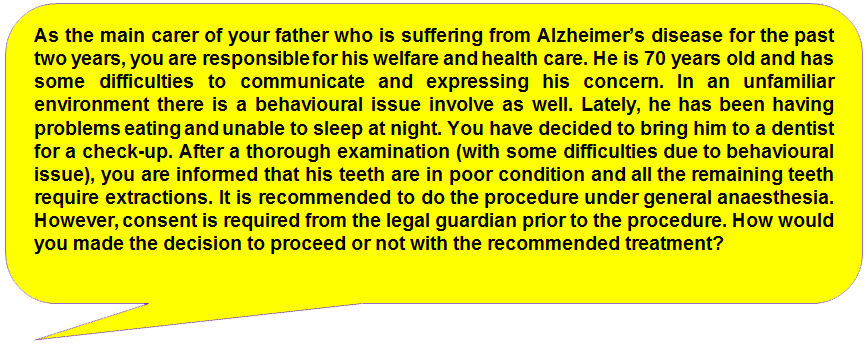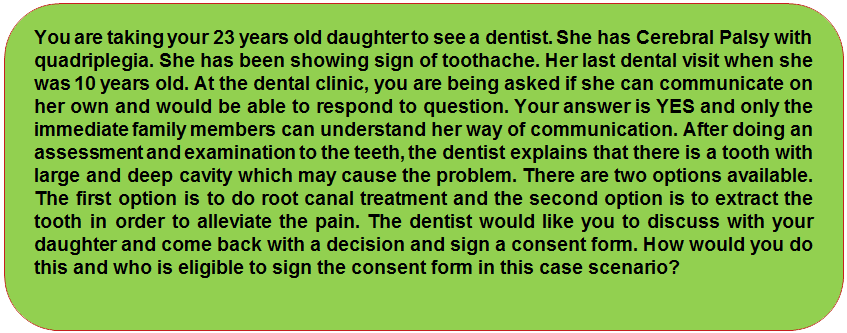Consent can be defined as a permission granted by a competent person to do something after enough relevant information is given and the information is understood well. Questions related to issue of consent include who is the ‘competent person’ and can a person give consent for someone else if the involved person is unable to grant permission to undergo any health procedure due to certain impairment or disability?
Situation 2: (Alzheimer’s disease)

In both situations, you may simply think that you are the one who is responsible to give consent for treatment. However, before you decide to agree with the proposed procedure, you should be aware that in the current policy, everyone is presumed to be competent to make informed choice and give informed consent for themselves unless proven otherwise. How would you know that the person you are taking care of is incompetent? Although it is the responsibility of the dentist to acknowledge issue of consent, as a carer for your loved one, having some knowledge on this issue may assist you in making a reasonable decision.
Generally, someone is unable to give consent if:
- Unconscious.
- A child under 16 year old (18 year old in Malaysia).
- A person above 16 year old but unable to understand the nature and effect of treatment.
According to the Malaysia Mental Health Act 2001 ACT 615, in order to determine a person with mental health problem has the ability to provide own consent, one should consider whether or not the person understands:
- The condition for which the treatment is proposed;
- The nature and purpose of the treatment;
- The risks involved in undergoing the treatment;
- The risks involved in not undergoing the treatment; and
- Whether or not his ability to consent is affected by his condition.
Additionally, in making decision for the person you are taking care of, please consider:
- The decision you are making is in the best interest of the person if he/she is able to give own consent.
- An attempt has been made to find out what he/she thinks about the procedures being suggested.
- Your inclination tells you that this is what he/she would agree if they were able to give own consent.
Are you the right person to give consent on behalf of someone else?
The answer is YES if:
- You are the guardian in the case of a minor or a relative in the case of an adult, if the person is incapable of giving consent.
- You are interested in the welfare of the person.
The answer is NO if:
- You are not the legal guardian or relative of the affected person.
- The person is capable of giving own consent.
- You are not interested in the welfare of the person.
In a situation when the guardian or relative of the affected person is not traceable, the consent can be given by:
- Two psychiatrists/ medical/ dental professionals, one of whom shall be preferably the attending psychiatrist who assess the person’s mental condition,
Conclusion
Scenario 1
Since your daughter is able to communicate with you and understand the proposed treatment, your responsibility is to discuss with her about what has been explained by the dentist, ensure that she understands the pros and cons of the options given and guide her in making the decision in her best interest. Remember that the decision is not hundred percent in your hands as her cognitive ability is still intact even though you are her legal guardian. You can sign the consent form with her permission if she is unable to do so due to her disability. She has the full right to sign it herself if she wish to by using her thumbprint or in some other agreeable manners.
Scenario 2
You may be the right person to make a decision for consent prior to the treatment. The reasons are because you are the main carer, interested in his welfare and your father understands about the nature and effect of the treatment is questionable. Therefore, he may not be competent enough to give consent for himself. However, in making the decision for him, please take into consideration that your decision would be in his best interest and what he would do if he was able to give own consent. Prior discussion with other family members can be very helpful in guiding you to choose the best treatment approach for him.
References
- Dougall A., Fiske J., Access to Special Care Dentistry Part 3: Consent and Capacity, British Dental Journal, 2008, 205: 71-81
- Malaysian Mental Health Act 2001 ACT 615. Malaysia: Laws of Malaysia, The Commissioner of Law Revision Malaysia, 2006: 49-51
| Last Reviewed | : | 25 August 2015 |
| Writer / Translator | : | Dr. Siti Zaleha bt. Hamzah |
| Accreditor | : | Dr. Norjehan bt. Yahaya |








